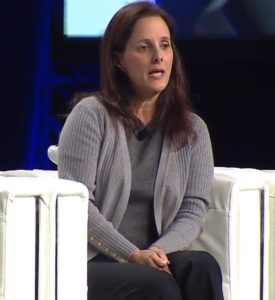
Cristina Maxwell’s world came crashing down when she learned the diagnosis of her son who had just graduated from kindergarten: a malignant brain tumor.
The 5-year-old had to undergo chemotherapy and radiation.
And when his health improved, the family faced another hurdle. Nicolas now faced significant learning disabilities because of the chemotherapy and radiation he endured.
“We had him tested and the (doctor) basically told us we would have to create a program for him and extensive speech therapy to talk again,” Maxwell said. She spoke alongside other parents and students on a panel at the Foundation for Excellence in Education’s national gathering in Nashville. “Frankly the cost of that was astronomical” — as much as $50,000 a year, according to a column in the Sun-Sentinel.
Those costly, wide-ranging therapeutic needs meant a conventional, seven-hour-a-day classroom setting wouldn’t work for Nicolas.
As a result, Maxwell hoped she could secure a Gardiner scholarship, which provides education savings accounts for children with special needs.
The scholarships are worth approximately 90 percent of the amount the state would spend to educate a child in public schools. Parents can use the money to pay for private-school tuition, homeschool curriculum, therapies, public-school courses, college savings and other approved education-related expenses. Step Up For Students, which publishes this blog, helps administer the program.
But then Maxwell learned that children like Nicolas were not eligible for the program.
“This isn’t fair,” she said. “I want to change the law. I was going to call my representative. Who is going to say ‘no,’ to a kid with cancer to expand the scholarship? I found that this was our new battle. This issue is such a partisan issue so I couldn’t get my representative to call me back. My challenge was fighting the Legislature.”
The endeavor became a full-time job for Maxwell, who is an attorney.
“I kept thinking of those other kids with cancer that are diagnosed every day,” she said. “I know they need this too.”
After much persistence, Maxwell prevailed. The Florida Legislature passed HB 15, which expanded eligibility for the program to include children who are deaf or visually impaired, as well as those with rare diseases or traumatic brain injuries.
The issue proved not to be so partisan after all, as the legislation received unanimous support in the state House and bipartisan backing in the Senate.
“I kept thinking of those other kids with cancer that are diagnosed every day,” Maxwell said.
Maxwell said it shouldn’t have had to be so difficult.
“I shouldn’t have to be fighting this hard for kids with cancer,” she said. “They fight so hard just to live and they make it through the tunnel and at the end of the tunnel there is another obstacle in education. It shouldn’t have to be so hard. It should not be a partisan issue.”



Thank you for sharing your story about your son Nicolas and his courage at the tender age of 5 years old..
Your story demonstrates courage and will inspire other parents to do whatever it takes to ensure their children and all kids have access to the educational opportunity they need to be successful not just in school but in life.
Connecticut children, most in need, would clearly benefit from Education Savings Accounts
Please give Nicolas a big hug from Connecticut 🙂